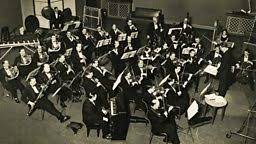Lemare, Iris Margaret Elsie (1902–1997) was the first professional British woman conductor, and also a keen supporter of the music of British composers. She was the first woman to conduct the BBC Symphony Orchestra (in 1936, and 1937) – which caused a stir in the press. Educated at the Royal College of Music, she attended conducting classes by Sir Malcolm Sargent, who apparently largely ignored her as the only female student. With the violinist Anne Macnaghten, she started the Macnaughten-Lemare Concerts in London during 1930s and performed works by contemporary composers, particularly female.
In 1940 she conducted the Northern Philharmonic Orchestra and subsequently moved north to York, living in Copmanthorpe for the next 30 years. She founded the Lemare Orchestra in 1949 and, with Iris as conductor, they performed at various venues across the city, including the Minster and the University of York. In 1965-66 York Corporation (as it was then) stopped the cash grant to the orchestra, much to her dismay. In 1970s she gave an interview in which she sounded off about the lack of opportunities for orchestral music in York, outside of the festival, after two cinema venues where her orchestra performed were turned into bingo halls, and she threatened to retire to the country.
From 1970 to 1984 she was the conductor of the Durham County Opera and Opera Nova, who performed operas by Benjamin Britten, Elizabeth Maconchy, and Menotti among others, together with the première of McCabe’s The Play of Mother Courage. Her later years were spent as a lecturer, an adjudicator at Music Festivals across the UK, and examiner, primarily in the North of England. In her late 80s she developed one of the first music groups in York’s University of the Third Age. Iris died at her home in Askam Bryan in 1997. Some of her personal papers are held in the archives at York Explore, including her scrapbooks – containing programmes, newspaper cuttings, and her music certificates –and a studio print portrait taken in London during the1930s. Warwick University holds personal letters and postcards (1928-1945) from Richard Crossman, Labour MP, and editor of the New Statesman, to her.
References
- R. Seaman, ‘Lemare, Iris Margaret Elsie(1902–1997)’,Oxford Dictionary of National Biography, Oxford University Press, 2004, online edn, Oct 2007 [http://0-www.oxforddnb.com.catalogue.libraries.london.ac.uk/view/article/66182, accessed 17 Oct 2017]
- York Explore Archives LEM/2/6
- Photo source: BBC website – BBC Symphony Orchestra 1937

